Every Kazakhstani has the potential to be a book hero, with their story crafted by artificial intelligence

This year, the startup Mystory was awarded USD 25 thousand in the Best AI Startup category at the Astana Hub Battle. Its founders conceived an intriguing idea: to publish tangible paper books with the assistance of AI, featuring any person as the main hero—whether it be your child, wife, girlfriend, or colleague.
As part of the joint project with Astana Hub "100 Startup Stories of Kazakhstan," Digital Business interviewed the co-founder of Mystory, Aitemir Mudinov, who shared insights into the audience for personalized books, the role of superheroes in teaching children to brush their teeth, and the potential for AI to entirely replace human creative work.
“We had a strong desire to create something with AI”
— Our team is international, consisting mainly of individuals from various countries within the CIS. The project was initiated by two individuals—myself and my partner, Nurislam Ashirmatov.
Prior to that, Nurislam resided in China for eight years, where he completed his studies at a leading university, founded startups, and ran his own marketing agency.

Aitemir Mudinov and Nurislam Ashirmatov
Mystory was initiated in Kyrgyzstan at the end of May, but we opted to concentrate on a larger and more mature market. Due to the extensive integration of the Kyrgyzstan and Kazakhstan economies and the strong fraternal ties, the decision in favor of Kazakhstan was clear to us.
— Why books?
— We developed a strong interest in working with AI, and it evolved into our passion. When generative systems gained popularity and the third version of GPT emerged, we delved into studying this aspect and found it intriguing. The desire to create something substantial started to take shape.
We chose to concentrate on personalization. Initially, we attempted to develop an online fitting room, but we halted the project due to its high development costs. Recognizing the potential to move in this direction without being tied to a specific product, we concluded that books were the right avenue—a novel approach to content personalization.
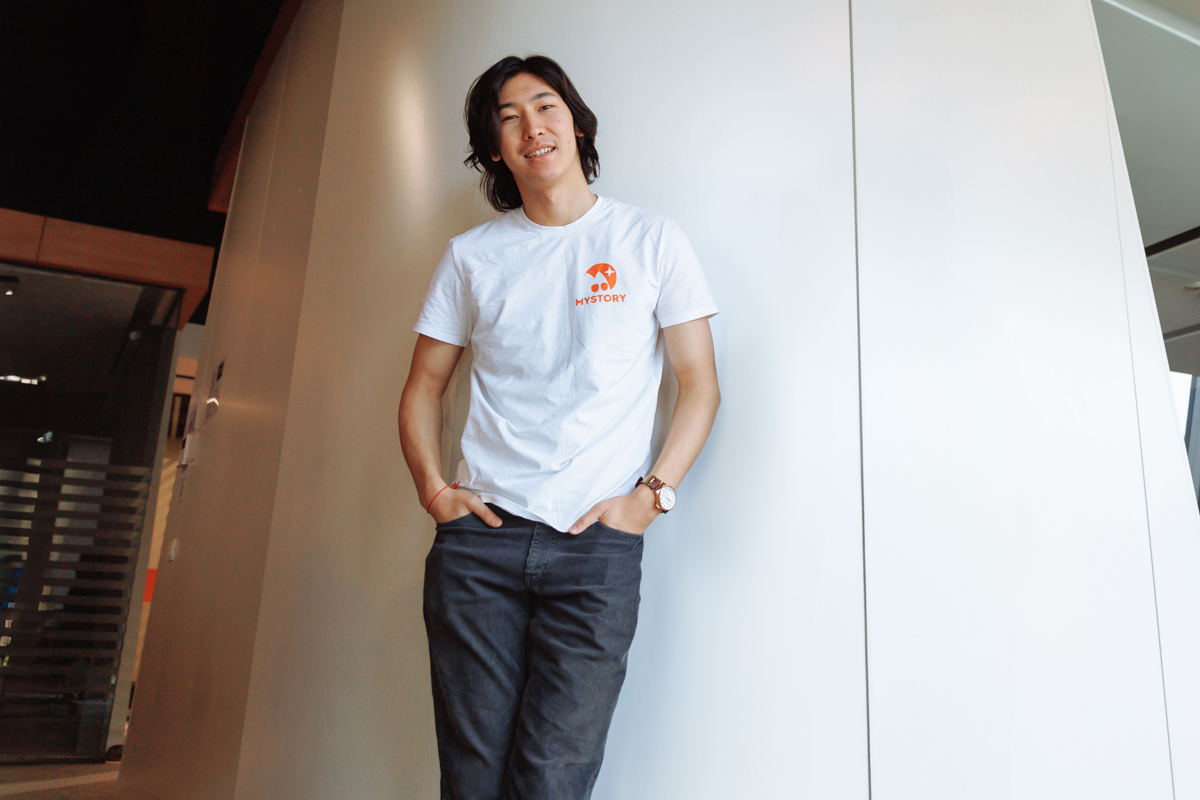
Initially, we crafted simple items, almost without software, starting from scratch. As we observed a growing demand, we began developing our own software to optimize the creation process.
The key feature of all our personalized books is the individual serving as the main protagonist, with their face and their close connections. Whether it's a child or an adult, the character resembles themselves, allowing for easy recognition. This fosters a deeper connection and engagement in the story, directly influencing the utilization of the content.
All our stories are crafted from the ground up. The individual placing the order for the book has the freedom to select any superhero, adopt the storyline of a renowned movie like Titanic, or even devise something entirely unique.
Spider-Man teaches good habits
— Who orders personalized books?
— We have two roughly equal segments in terms of orders - B2C and B2B. The first segment mainly consists of parents requesting personalized books about their child—depicting how they, along with their favorite heroes, save the world and perform good deeds. Additionally, we incorporate beneficial elements into these stories.
For instance, in one story, Spider-Man encourages picking up toys, stating that it's cool. Surprisingly, children genuinely start picking up their toys simply because Spider-Man suggested it. Many parents express amazement, asking how we achieved such an impact. It's the result of personalization; the strong influence occurs precisely because the story is tailored to the individual child.
Loving couples also order books featuring a love story, either to propose through a book or as a wedding gift. For instance, a storyline in the book might conclude with a proposal - "Will you marry me?" - leaving blank lines for the girl to write either yes or no. Interestingly, "yes" is a very common response in our books. In other words, we can say that we have played a role in marrying many couples.
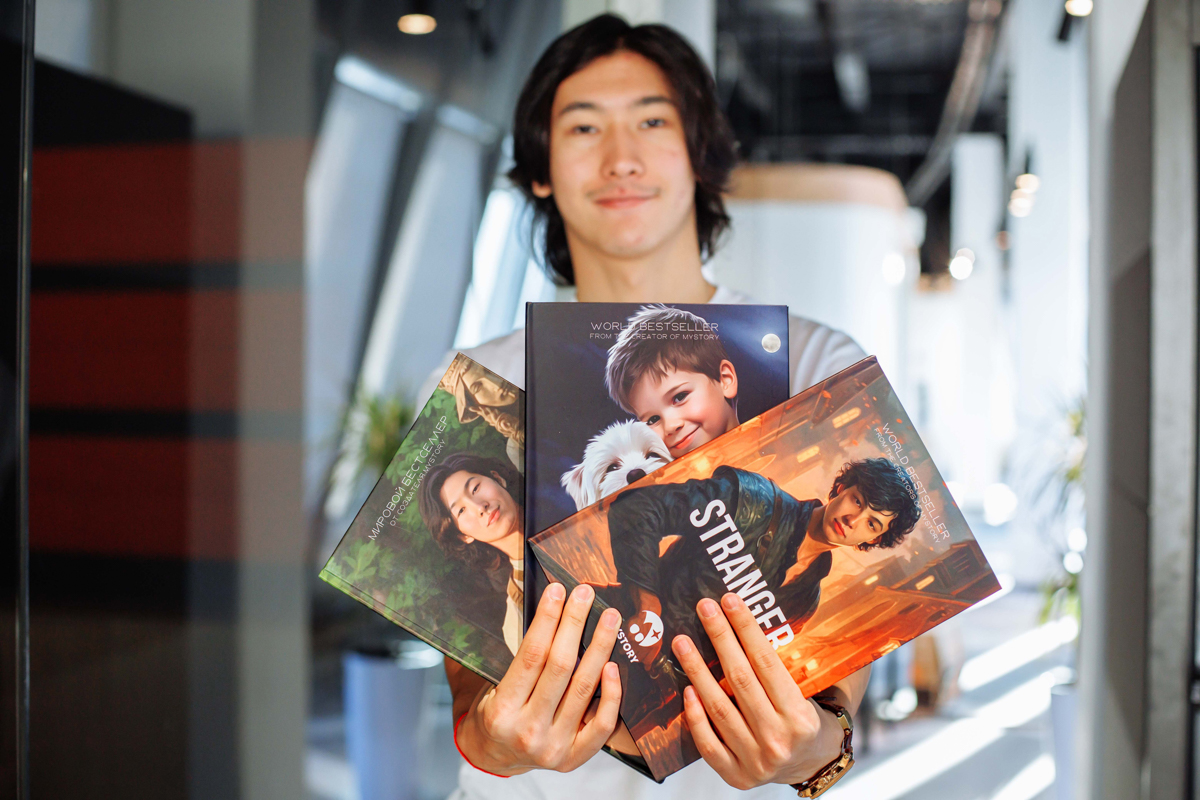
Regarding the B2B segment, companies order our books as gifts for their employees, partners, clients, and colleagues, particularly for occasions like birthdays. The minimum order quantity in the corporate segment is 10-20 items. Numerous ideas exist for utilizing our personalized books in the corporate setting. They are predominantly employed as gifts associated with the company, where the storyline intertwines with the individual receiving the book and the company itself. Such a person is likely to keep the book and prominently display it, as their face is featured on the cover. For instance, in one story, a hero emerges in medieval times using a time machine and receives a surprising call on his mobile phone.
He's amazed that anyone can call him in medieval days, only to discover that the mobile operator, activ, has coverage even there. The potential for inventing and incorporating various stories that highlight products or brand elements in the storyline is extensive.
— Which of these audiences holds more potential for you?
— I think children. This market is more promising because of its vast size. Additionally, it offers a free, exciting, and engaging space.
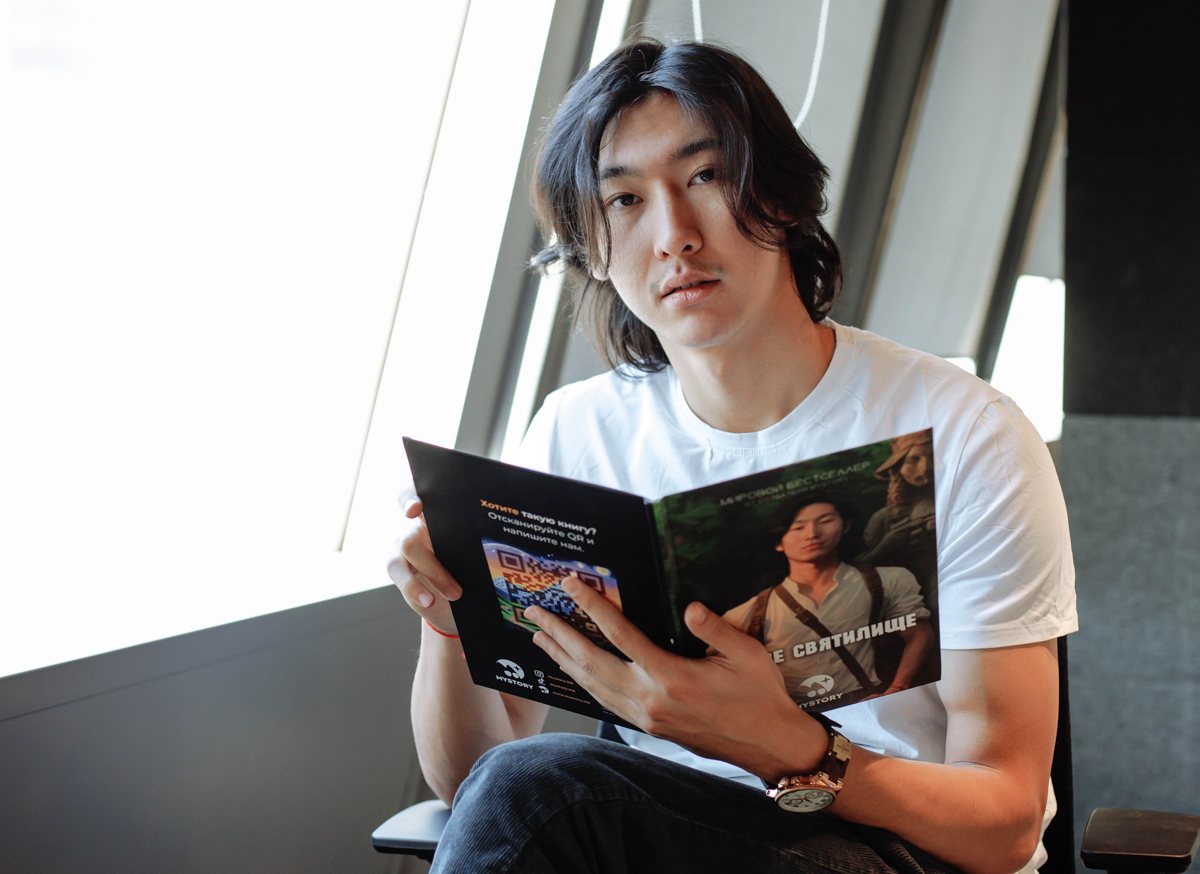
Parents are highly concerned about the psychological well-being of their children, which is why our primary focus for development is fairy tale therapy. We intend to collaborate with psychologists to create books, such as breaking boys and girls from bad habits and instilling good habits in them.
On the flip side, the B2B segment is also appealing to us, particularly when companies place substantial print orders for corporate events and anniversaries.
Sometimes, the neural network produces utter nonsense
— How does Mystory operate? For instance, if I wish to make a purchase, what steps should I take?
— You visit our website or message us on WhatsApp, place an order, and our manager contacts you to offer guidance on your book request. If you're satisfied with the details, you fill out a form specifying your preferences and requirements for the story—such as its content, style, desired characters, and more. There are no limitations; you can envision anything you desire, whether it's a Titanic-themed tale or featuring wolf-men at the end. Additionally, you'll need to provide a photo of the person who will be the hero of the book.
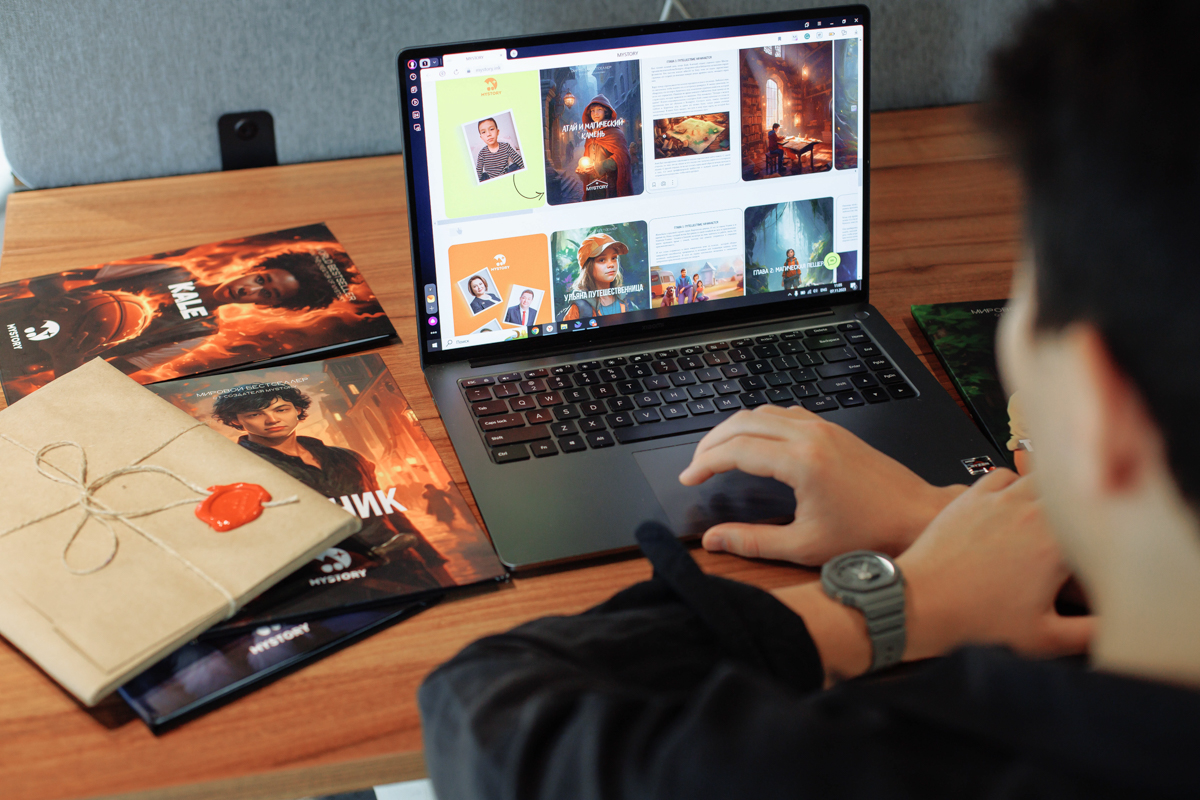
We finalize all the details and set the delivery date. Once it's ready, we furnish the electronic version, allowing for any necessary corrections. Subsequently, we send the book for printing to the printing house, and it's worth noting that there's already a two-week waitlist.
— What occurs inside the black box: how is the book production process undertaken?
— We employ multiple AI models, including ChatGPT for texts and Stable Diffusion for images, which we have further trained with datasets. However, to enhance the appeal of the books, we run them through our in-house editorial process.
— Does the software deliver the finished book directly?
— No, it's not that straightforward. Honestly, at times, the AI produces complete nonsense. It was particularly challenging in the beginning—we had to manually rework 80% of the text. However, we adapted by offering examples of good storylines and styles, leading to a significant improvement in the final results. In essence, we've fine-tuned our software for scalability to achieve maximum automation.
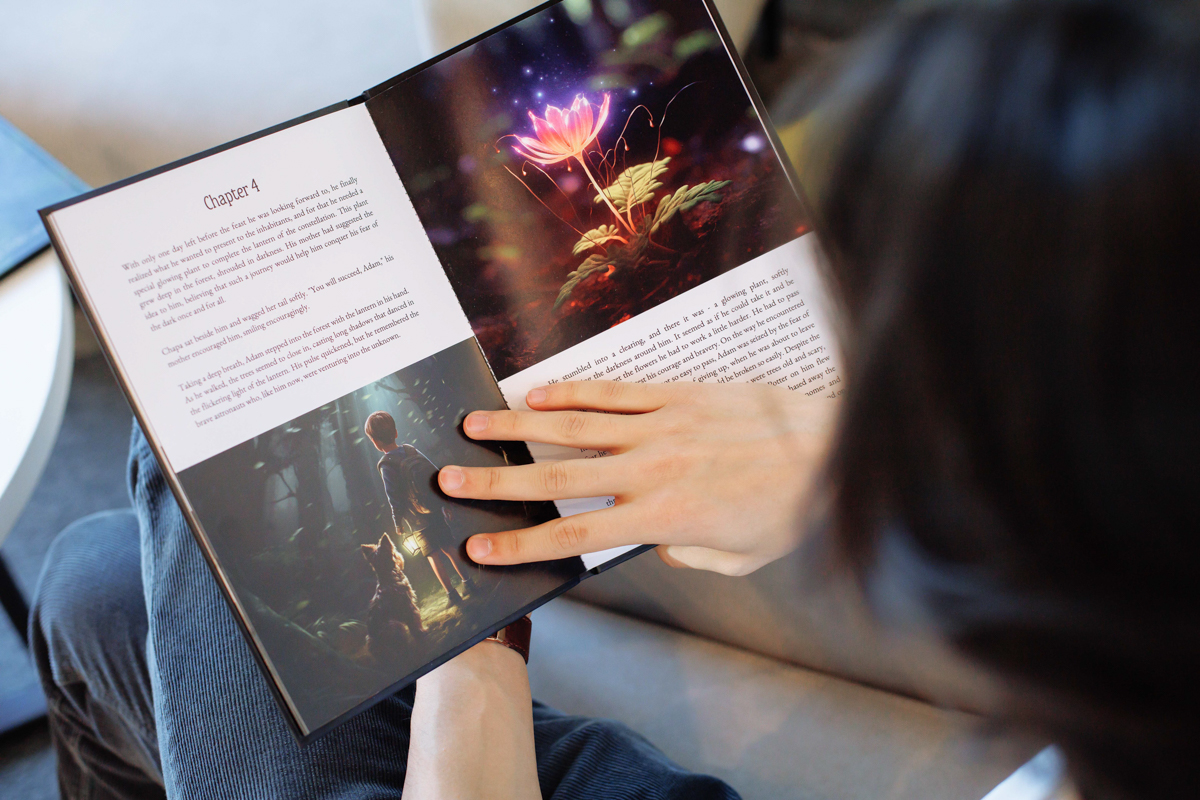
We always advocate for creativity, believing that a genuinely cool creative product can only be crafted by a person. Hence, we strive to strike a balance between leveraging technology and fostering creativity.
— Are there plans to develop and train your own neural networks?
— There is merit in that idea, but it comes with a hefty cost. A very high cost. So, for now, the answer is no.
Japanese comics and merch with celebrities
— What are the future prospects for the startup's development? During the Astana Hub Battle, you noted the intention to shift towards producing digital content rather than published material.
— We have already started R&D to craft personalized manga - Japanese comics.
We have multiple avenues for development to deliver personalized content through various channels. For instance, fairy tale therapy can be adapted into a mobile application for children, and we also have plans to create personalized comics, among other initiatives.
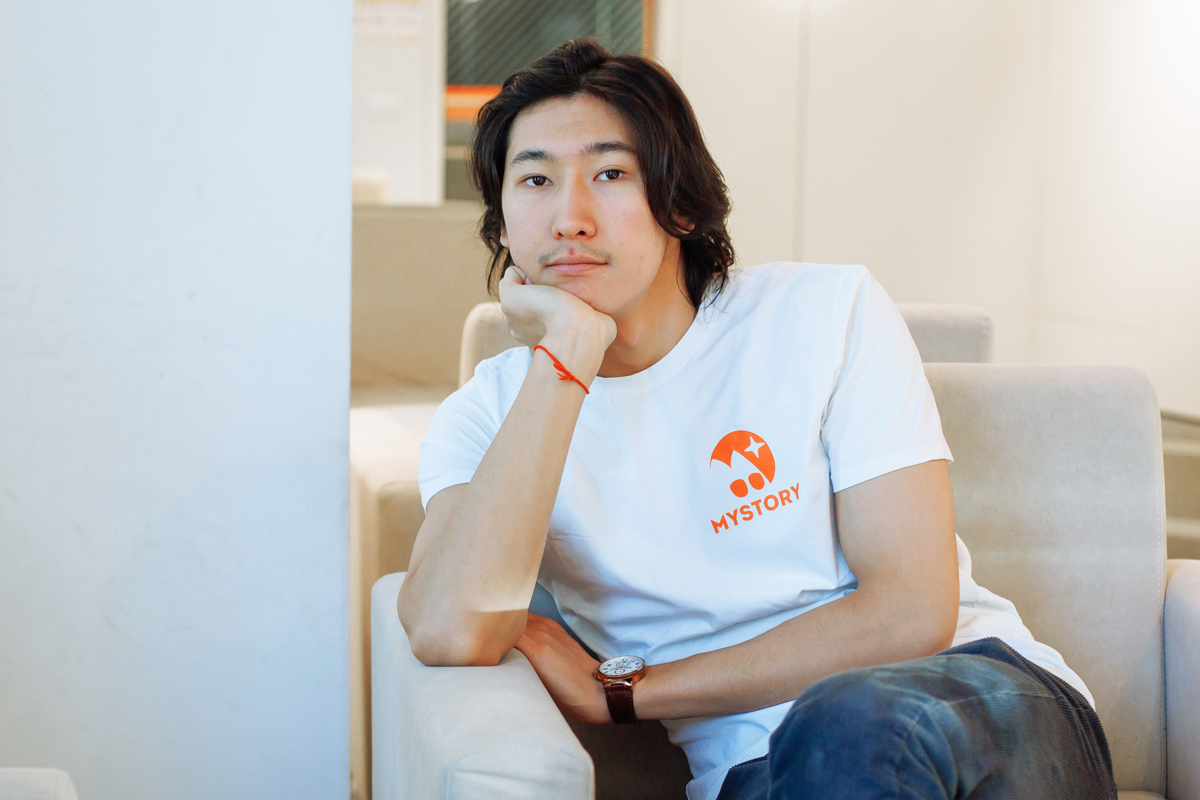
There are plans to collaborate with bloggers, actors, and other notable figures to co-create and sell merchandise featuring their images. For instance, offering the option to order a book with your idol, embarking on adventures together. Currently, negotiations with celebrities are underway, but contracts have not been signed yet.
— How will you distribute such content?
— Through a mobile application subscription: upon purchasing access, your child will receive new tales featuring them as the hero, and you will receive manga issues.
It may appear to be a shift in our focus, but the software responsible for creating such personalization remains the same—it can generate both children's books and comics.
We secured $100,000 for development purposes
— What is the current revenue of Mystory?
— From the start, we sustained the startup using our own funds. However, in September, we achieved our first profit, with monthly revenue totaling $10,000.
Subsequently, we expanded our team by bringing on board additional developers and managers as we opted to expedite our growth. With increased costs, the project is currently not profitable. Nevertheless, we have plans to enter the markets of neighboring countries, boost advertising budgets in Kazakhstan, and aim to return to profitability.
— Is your current operation limited to Kazakhstan?
— Yes, our sales are currently focused in Kazakhstan, with a small portion in Kyrgyzstan. We have plans to expand into neighboring countries such as Uzbekistan and Tajikistan. The next potential step is likely to be Turkey.
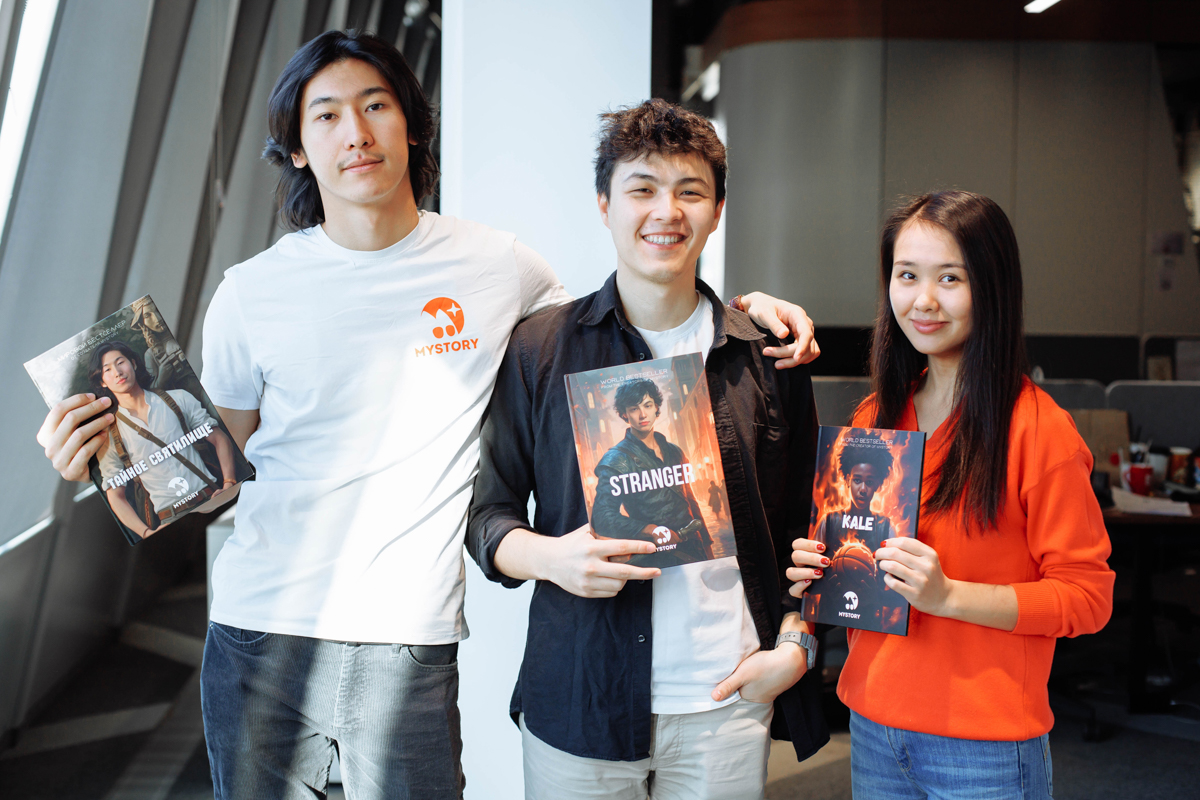
However, for substantial growth, the USA market is our target—we need to establish a presence there. We are already conducting initial tests. Yet, entering this market is challenging due to intense competition. We not only compete with similar personalized products but also with the overall gifts market. Gaining the attention of US consumers for our product is a significant challenge.
— Can you operate in other countries while based in Kazakhstan?
— Yes, absolutely. However, it would be more convenient if we can arrange for book publishing with local printing houses.
— How do you plan to use the $25,000 won at Astana Hub Battle, and are you seeking further investments?
— We'll allocate the funds for development.
Recently, we’ve secured $100,000 with an estimate of $1.5 million from Evgeniy Matveev, ex-founder of Aviata.kz. Currently, we are not actively seeking investments and are concentrating on the rapid growth of the project.
AI will replace many roles within the next 20 years
— What is your perspective on the future development of neural networks? Will there still be room for human creativity, or do you foresee a scenario where all content is generated by AI?
— I am optimistic about this matter, and my response is as follows: currently, AI is not powerful enough to entirely replace humans. It may take another 15 years for AI to autonomously execute certain tasks instead of humans. However, for tasks that involve creative or artistic thinking, substantial amounts of data will be necessary. I believe artists are more likely to collaborate with AI, as it can assist them in creating faster and with higher quality.
However, my partner holds a pessimistic view. He believes that within 20 years, individuals like myself and others will no longer be necessary.
— What is your vision for the future of your startup in the next 5-10 years?
— Our aim is to create personalized entertainment and educational content that also serves as therapy. Currently, we focus on books, with plans to expand into comics and manga, and envision venturing into cartoons and movies in the future.
During our childhood, books, comics, and cartoons played a crucial role in helping us overcome challenges. We believe that our product can similarly assist both children and adults in overcoming difficult moments, addressing traumas, and ultimately fostering a bit more happiness.






